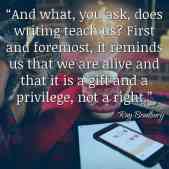Most useful textbook and academic posts of the week: December 27, 2019
 As is often the case during this holiday season, sources of academic writing experience and wisdom are quieter than usual, and those making noise across the internet are often reflective as we close one year and prepare for the next. In this week’s collection of articles from around the web, we found both advice for improving writing, research, and impact, as well as reflections on some of the accomplishments and best advice of 2019.
As is often the case during this holiday season, sources of academic writing experience and wisdom are quieter than usual, and those making noise across the internet are often reflective as we close one year and prepare for the next. In this week’s collection of articles from around the web, we found both advice for improving writing, research, and impact, as well as reflections on some of the accomplishments and best advice of 2019.
Ray Bradbury once wrote, “And what, you ask, does writing teach us? First and foremost, it reminds us that we are alive and that it is a gift and a privilege, not a right.” In this last weekly post of 2019, we remind you that your writing is a gift and one that you should treasure year-round. See you again in 2020! Happy writing!
Want to generate impact? Get creative.
Emerald Publishing’s Martyn Lawrence, when offering a matrix by which research impact could be measured, wrote this: Invisible research is, by definition, low impact. He might have gone on to write that invisible research is also a waste of time and money, because what is the point of spending months researching and writing up findings only for them to gather digital dust in an online archive? For researchers, this matters more than one thinks because funders are increasingly looking for a real return on their research dollars, euros and pounds.
How to apply the CRAAP test to your essay sources
Tell me if this sounds familiar: You’re searching online for sources for your research paper, and halfway through reading, you ask yourself, “Who writes this crap?” Good question.
A festive gift from patter – a checklist for revising methods chapters
PhDers sometimes find writing the thesis methods chapter a pretty tedious business. But the methods chapter is a key part of the examination process – it shows that the researcher knows how to research. You see, examiners make their decision – yes or no, this person can be Dr – on the back of this chapter. It’s not all that matters for sure, but get this chapter wrongish, and doubts arise, questions are asked, corrections loom.
Celebrating 2019 accomplishments
For the last couple of weeks, I have been heavy into 2020 goal setting mode and I couldn’t be happier about it. December is one of my favorite times of the year to reflect on how things went over the last 12 months and then look to the future and set some intentions. Recently, I facilitated a session for Prolific members on reflecting on 2019 writing accomplishments and I couldn’t believe the things I had forgotten about that happened in 2019!
The year in review: 2019 in The Scholarly Kitchen
This should be our last post of the year for 2019 (unless something urgent comes up over the holidays). With things shutting down for the end of the year, it’s a good time to look back on 2019, a busy time in The Scholarly Kitchen as we predicted with the year’s first post at the beginning of January.
Best Pubcoach blog posts for 2019
I write each installment of Power Writing with high hopes about how it might interest — and help — my readers. Some topics, I can tell, are right on the nose. Others, it seems, are something of a near miss. And still others are what might be called “lead balloons.” They sink to the floor of the ocean of reader interest with barely a trace. It always intrigues me to see which ones resonate most powerfully. And, interestingly, they are almost never the ones I expect!
Please note that all content on this site is copyrighted by the Textbook & Academic Authors Association (TAA). Individual articles may be reposted and/or printed in non-commercial publications provided you include the byline (if applicable), the entire article without alterations, and this copyright notice: “© 2024, Textbook & Academic Authors Association (TAA). Originally published on the TAA Blog, Abstract on [Date, Issue, Number].” A copy of the issue in which the article is reprinted, or a link to the blog or online site, should be mailed to Kim Pawlak P.O. Box 337, Cochrane, WI 54622 or Kim.Pawlak @taaonline.net.

